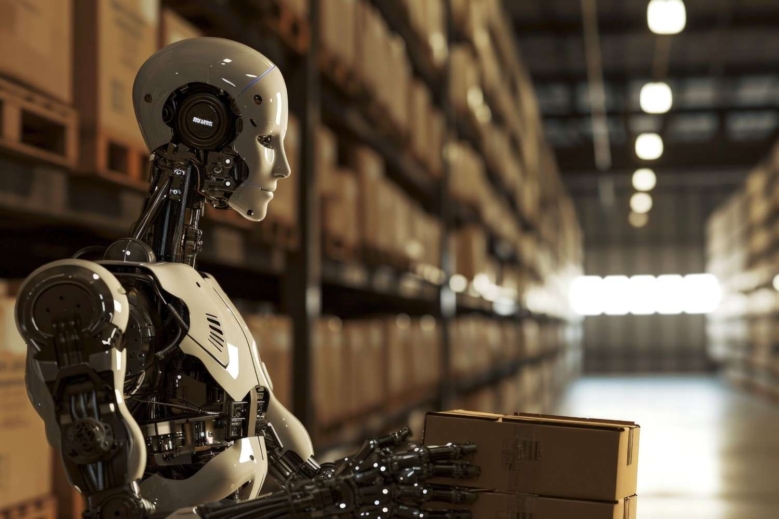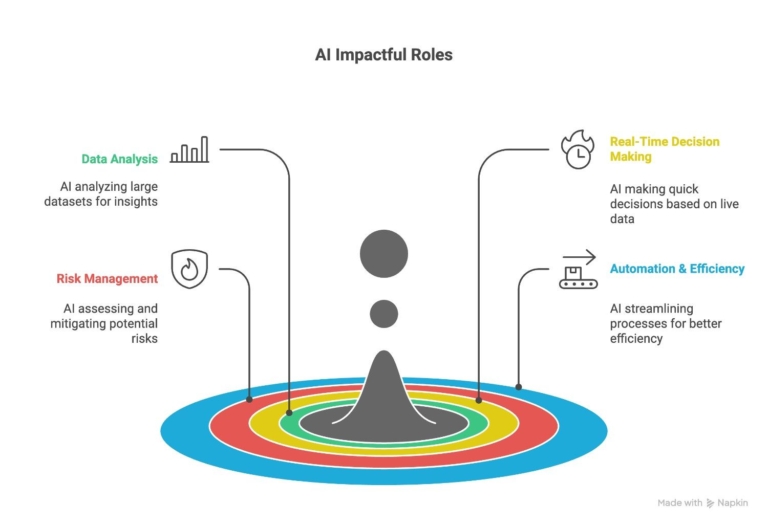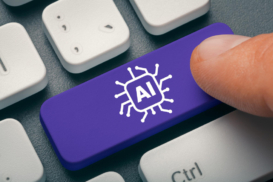Greetings! I'm Aneesh Sreedharan, CEO of 2Hats Logic Solutions. At 2Hats Logic Solutions, we are dedicated to providing technical expertise and resolving your concerns in the world of technology. Our blog page serves as a resource where we share insights and experiences, offering valuable perspectives on your queries.

Quick Summary
This blog explores how AI and predictive analytics are transforming retail supply chains. It explains how businesses can forecast demand, optimize inventory, and prevent lost sales using AI-driven insights. Learn about key applications, benefits, challenges, and real-world examples to understand how AI is shaping smarter, more efficient, and resilient retail operations.
Supply chains are the backbone of every business. It ensures that products move easily from manufacturers to customers. However, as global trade becomes increasingly complex, traditional supply chain methods often struggle to keep pace with these challenges. They are like demand fluctuations, shipping delays, labor shortages, and rising costs.
This is where Artificial Intelligence (AI) is making a real difference. It can analyze vast amounts of data, predicting patterns and automating decisions. AI is transforming supply chain management into a smarter, faster, and more resilient system.
In this blog, we’ll explore how AI is revolutionizing supply chains, the key applications you need to know, and the benefits and challenges.
The Role of AI in Modern Supply Chains
Traditional supply chains relied heavily on manual processes, historical data, and human decision-making. While these methods worked in simpler times, today’s supply chains are global, highly interconnected, and vulnerable to disruptions such as economic shifts, geopolitical issues, and natural disasters.
AI steps in as a game-changer by introducing data-driven intelligence and automation at every stage of the supply chain. AI is used to predict, prevent, and proactively solve challenges.
Some of the most impactful roles AI plays include:

- Data Analysis at Scale: AI systems can process millions of data points from suppliers, warehouses, and markets faster than humans ever could.
- Real-Time Decision Making: Instead of waiting for weekly or monthly reports, AI enables instant adjustments to production, shipping, and inventory.
- Risk Management: AI helps businesses identify potential disruptions, from supplier failures to logistic bottlenecks, and suggest preventive strategies.
- Automation & Efficiency: Repetitive, time-consuming tasks like order tracking, demand planning, and supplier matching can be automated with AI tools.
Key Applications of AI in Supply Chain Management
1. AI in Demand Forecasting
Accurate demand forecasting has always been a challenge. AI uses predictive analytics and machine learning to analyze past sales, market trends, and external factors like seasonality or economic shifts. This enables businesses to predict future demand with higher accuracy, helping avoid both overstocking and stockouts.
Pro Tip: Businesses using AI-powered demand forecasting can reduce forecasting errors by up to 50%.
2. AI-Powered Inventory Management
AI ensures that warehouses and retail shelves always have the right amount of stock. Through real-time inventory tracking, AI can suggest when to reorder products, optimize storage space, and reduce carrying costs. This is particularly useful for companies handling large product catalogs or seasonal goods.
3. Predictive Maintenance in Logistics
Delivery trucks, factory machines, and warehouse equipment often break down unexpectedly, causing costly delays. AI-powered predictive maintenance uses IoT sensors and machine learning models to detect early signs of wear and tear. By fixing issues before they escalate, businesses can minimize downtime and improve supply chain reliability.
4. AI-Driven Procurement & Supplier Management
Choosing reliable suppliers is critical for smooth operations. AI tools can evaluate supplier performance, predict risks like delivery delays, and even recommend alternative vendors. Automated procurement systems also speed up contract management and negotiations.
5. Route Optimization & Last-Mile Delivery
Last-mile delivery is often the most expensive part of logistics. AI uses real-time traffic data, weather updates, and delivery patterns to optimize routes and minimize costs. For eCommerce, AI ensures that customers get faster deliveries and real-time tracking updates.
Benefits of Using AI in Supply Chains
Implementing AI in supply chain management brings measurable advantages across efficiency, cost, and customer satisfaction. Here are the key benefits:
1. Improved Efficiency and Cost Savings
AI automates repetitive tasks like order processing, inventory checks, and supplier matching. This reduces human errors, accelerates operations, and lowers labor costs.
Example: A global retailer using AI for inventory optimization cut excess stock by 30%, saving millions in storage and holding costs.
2. Better Demand Forecasting and Inventory Planning
AI predicts demand patterns more accurately than traditional methods. This ensures products are available when needed, reducing stockouts and overstock scenarios.
Example: An ecommerce brand using AI-driven demand forecasting saw a 25% increase in sales due to better stock availability during peak seasons.
3. Enhanced Customer Satisfaction
Faster deliveries, accurate order fulfillment, and real-time tracking powered by AI improve the customer experience. Happy customers are more likely to become repeat buyers.
4. Risk Mitigation and Disruption Management
AI can identify potential disruptions in the supply chain, like supplier delays, transportation issues, or geopolitical risks, before they escalate. Companies can then take proactive measures.
Example: A manufacturing company avoided a production halt by using AI to flag supplier risks in advance.
5. Data-Driven Decision Making
AI transforms raw data into actionable insights. Businesses can make smarter strategic decisions about sourcing, logistics, pricing, and inventory management.
Pro Tip: Combining AI insights with human expertise ensures the most effective supply chain decisions.
Challenges in Implementing AI for Supply Chain Management
While AI offers transformative benefits, integrating it into supply chains isn’t without hurdles. Businesses need to be aware of the following challenges:
1. Data Quality and Integration Issues
AI relies on clean, accurate, and comprehensive data. Many companies struggle with fragmented data across multiple systems, outdated records, or inconsistent formats. Poor data quality can lead to inaccurate predictions and ineffective AI models.
2. High Implementation Costs
Setting up AI-powered supply chain systems requires investment in software, hardware, and skilled personnel. Smaller businesses may find these costs prohibitive initially, though long-term savings often justify the investment.
3. Workforce Adoption and Change Management
Employees may resist AI adoption due to fear of job displacement or lack of understanding. Proper training, communication, and change management strategies are critical for smooth adoption.
4. Technical Complexity
AI implementation requires expertise in machine learning, predictive analytics, and system integration. Without the right technical guidance, companies risk delayed deployments or underperforming AI solutions.
5. Security and Privacy Concerns
Supply chain AI systems handle sensitive data, including supplier contracts, customer information, and shipment details. Ensuring data security and regulatory compliance is essential to prevent breaches and legal issues.
Conclusion
Artificial intelligence is no longer a futuristic concept for supply chains; it’s a present-day reality that is redefining how businesses operate. From improving demand forecasting and inventory management to optimizing logistics and mitigating risks, AI is helping companies become more efficient, resilient, and customer-centric.
However, successful AI adoption requires careful planning, quality data, and skilled personnel. The future of supply chains is smart, predictive, and highly automated, and AI is at the heart of this transformation. Businesses that embrace AI today will be the leaders of tomorrow’s supply chain landscape.
Weekly Insights
Get our best content delivered to your inbox every week.
FAQ
How does AI improve demand forecasting in supply chains?
AI analyzes historical sales data, market trends, and external factors to predict future demand accurately, helping businesses avoid overstocking or stockouts.
What are the key applications of AI in inventory management?
AI helps track stock levels in real-time, automates reordering, optimizes warehouse space, and reduces holding costs, making inventory management more efficient.
How can AI-driven supply chain optimization prevent lost sales?
By predicting demand, optimizing routes, and managing suppliers proactively, AI ensures products are available when and where customers need them, reducing missed sales opportunities.

Related Articles








